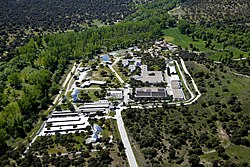 Aerial view of ESAC | |
| Abbreviation | ESAC |
|---|---|
| Type | IGO |
| Location | |
| Leader | Carole Mundell (Director) |
Parent organization | European Space Agency |
| Website | www |
| Remarks | ESAC is one of nine establishments operated by ESA[1] |
The European Space Astronomy Centre (ESAC) near Madrid in Spain is the ESA's centre for space science (astronomy, Solar System exploration and fundamental physics). It hosts the science operation centres for all ESA astronomy and planetary missions together with their scientific archives. Past and present missions represented at ESAC include (in alphabetical order) Akari, BepiColombo, Cassini–Huygens, Cluster, Exomars, Gaia, Herschel Space Observatory, Hubble Space Telescope, ISO, INTEGRAL, IUE, James Webb Space Telescope, LISA Pathfinder, Mars Express, Planck, Rosetta, SOHO, Solar Orbiter, Venus Express, and XMM-Newton.
Future missions to be represented from ESAC include Athena, Euclid, JUICE, and Plato.
In addition to deep space and solar system exploration, ESAC hosts the data processing of SMOS, a satellite observing the Earth, and the CESAR educational programme.
ESA's deep-space antenna in Europe is located in Cebreros, Avila, about 90 km from Madrid and 65 km from ESAC. This installation provides essential support to the activities of ESAC. Inaugurated in September 2005, Cebreros features a highly accurate pointing control system and a 35-metre antenna that allow ESA to gather data from distant missions to Mercury, Venus, Mars and beyond.

ESAC is also involved in ESA missions conducted in collaboration with other space agencies. One example is Akari, a Japanese-led mission to carry out an infrared sky survey, launched on 21 February 2006. Collaborative programmes include the NASA-led James Webb Space Telescope, the successor to the Hubble Space Telescope.
In addition, ESAC also hosts the Spanish Astrobiology Center (CAB), a research facility aimed mainly at encouraging young Spanish scientists to enter the fields of astrophysics and fundamental physics.
ESAC is located near Villafranca del Castillo, within the municipal limits of Villanueva de la Cañada, is located 30 km west of Madrid in the Guadarrama Valley. It lies in between evergreen oaks and at the foot of the ruins of the 15th-century Aulencia Castle.